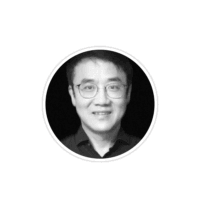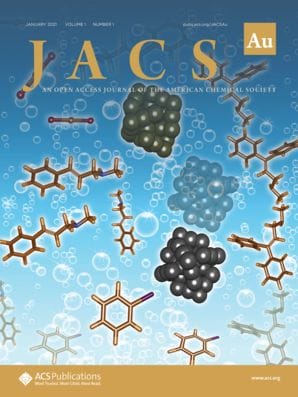For authors who need or desire to publish in a gold open access journal, JACS Au matches the exceptional editorial and publishing standards of JACS – the world’s most cited chemistry publication. As inaugural Editor-in-Chief Professor Christopher W. Jones expresses in this video sharing his vision for the journal, JACS Au is staffed and advised […]

For authors who need or desire to publish in a gold open access journal, JACS Au matches the exceptional editorial and publishing standards of JACS – the world’s most cited chemistry publication. As inaugural Editor-in-Chief Professor Christopher W. Jones expresses in this video sharing his vision for the journal, JACS Au is staffed and advised by top researchers from across the world.
We’re proud to introduce the Associate Editors of JACS Au:
Carole Duboc, Grenoble Alpes University/CNRS

Carole Duboc is a CNRS senior researcher at University of Grenoble Alpes (France), in the Department of Molecular Chemistry. She received her Ph.D. from the University of Grenoble in 1998 under the supervision of Professors Marc Fontecave and Stephane Menage. Her doctoral work dealt with bio-inspired diiron complexes for enantioselective oxidation catalysis. After a postdoctoral stay at the University of Minnesota with Professor William Tolman, she joined the High Magnetic Field Laboratory at Grenoble (2000-2007), where she started her CNRS academic career on the elucidation of magnetic properties of transition metal ion complexes based on a combined experimental (EPR spectroscopy) and theoretical approach. Her current research interests focus on bio-inspired complexes containing metal-sulfur bond(s) to develop homogeneous (electro)catalysts for the activation of small molecules via multi-redox processes, including the trapping and characterization of catalytic intermediates for mechanistic investigation.
***
Sabine L. Flitsch, The University of Manchester

Sabine Flitsch is a Professor at the School of Chemistry at the University of Manchester. She was educated in Germany, receiving her Diplom in Chemistry from the WWU Muenster and then obtained her DPhil under the supervision of Sir Jack Baldwin at Oxford University (UK). After three years as a postdoctoral fellow at MIT (USA) with Professor H.G. Khorana, she moved back to the UK, where she has held academic positions at the Universities of Oxford and Edinburgh, and moved to Manchester in 2005, where she currently holds a Chair in Chemical Biology.
Hyunjoo Lee, Korea Advanced Institute of Science and Technology

Hyunjoo Lee is a Full Professor in the Department of Chemical and Biomolecular Engineering, Korea Advanced Institute of Science and Technology (KAIST), South Korea. She obtained her Ph.D. degree from California Institute of Technology, USA, in 2005 and performed post-doctoral research at University of California, Berkeley, USA. She started her independent research in 2007 at Yonsei University, South Korea, and moved to KAIST in 2014. Her research is focused on developing nanomaterials, particularly for heterogeneous catalysts. She has studied various gas/liquid-phase reactions and electrochemical reactions, such as exhaust treatment, methane conversion, CO2 conversion, fuel cells, and water electrolysis. She was recently elected a member of Young Korean Academy of Science and Technology.
***
Nuno Maulide, University of Vienna

Nuno Maulide was born in Lisbon, Portugal. He completed an M.Sc. at the Ecole Polytechnique in 2004 and received his Ph.D. from the Université catholique de Louvain in 2007. He subsequently moved to Stanford University for Postdoctoral studies before returning to Europe, where he became Max-Planck Research Group Leader at the Max-Planck-Institut für Kohlenforschung in early 2009. In 2013, he moved to the University of Vienna as a Full Professor of Organic Synthesis. Since 2018 he is Adjunct PI at the Center for Molecular Medicine of the Austrian Academy of Sciences, Associate Editor at Organic Letters, and is a member of the Board of Editors at Organic Syntheses.
Nuno’s research interests are broadly rooted within the discipline of organic synthesis, spanning methods development, (asymmetric) catalysis, and target-oriented total synthesis with more recent forays into medicinal chemistry and chemical biology.
***
Rodney D. Priestley, Princeton University

Rodney D. Priestley is the Vice Dean for Innovation at Princeton University. He is also a Professor in the Department of Chemical and Biological Engineering and the Associate Director of the Princeton Center for Complex Materials. He obtained his Ph.D. in Chemical Engineering from Northwestern University in 2008. His research involves the description and development of complex materials, especially nanoparticles, thin polymer films, and nanocomposites, with a particular focus on behavior in confinement and at interfaces. His work is making an impact on industries ranging from personal care to aerospace. His recent interest includes the use of polymers in sustainability and their impact on the environment. Recent recognitions include the 2020 American Physical Society Dillon Medal and 2020 ACS Macro Letters-Biomacromolecules-Macromolecules Young Investigator Award. Priestley was also named to the Root 100 list of most influential African Americans and a World Economic Forum Young Scientist.
***
Xin Xu, Fudan University

Xin Xu received his Doctoral Degree in Theoretical Chemistry from Xiamen University, China, in 1991. After a postdoctoral stay at Fujian Institute of Research on the Structure of Matter, Academia Sinica, he became an associate professor in 1993 and was promoted to a full professor in 1995 in the Department of Chemistry, Xiamen University. He was also affiliated to the State Key Lab of Physical Chemistry on Solid Surfaces (PCOSS), China, where he acted as the deputy director from 1996 to 2003. He was appointed as Lu-Jia-Xi Chair professor in 2006. He was a visiting professor at Kyoto University, Japan; California Institute of Technology, USA; and Ecole Normale Supérieure de Lyon, etc. He is a distinguished professor at Fudan University, Shanghai, since 2010. His research interests involve the development of density functionals and linear scaling quantum chemical methods, and the modeling of reaction mechanisms on solid surfaces and in solutions.
***
A seventh Associate Editor for JACS Au will be appointed and announced in due course.
***
JACS Au supports the scientists and researchers who are required or who wish to publsh in a fully open access journal. All articles published in JACS Au are made freely available through either a CC-BY-NC-ND or CC-BY license.
